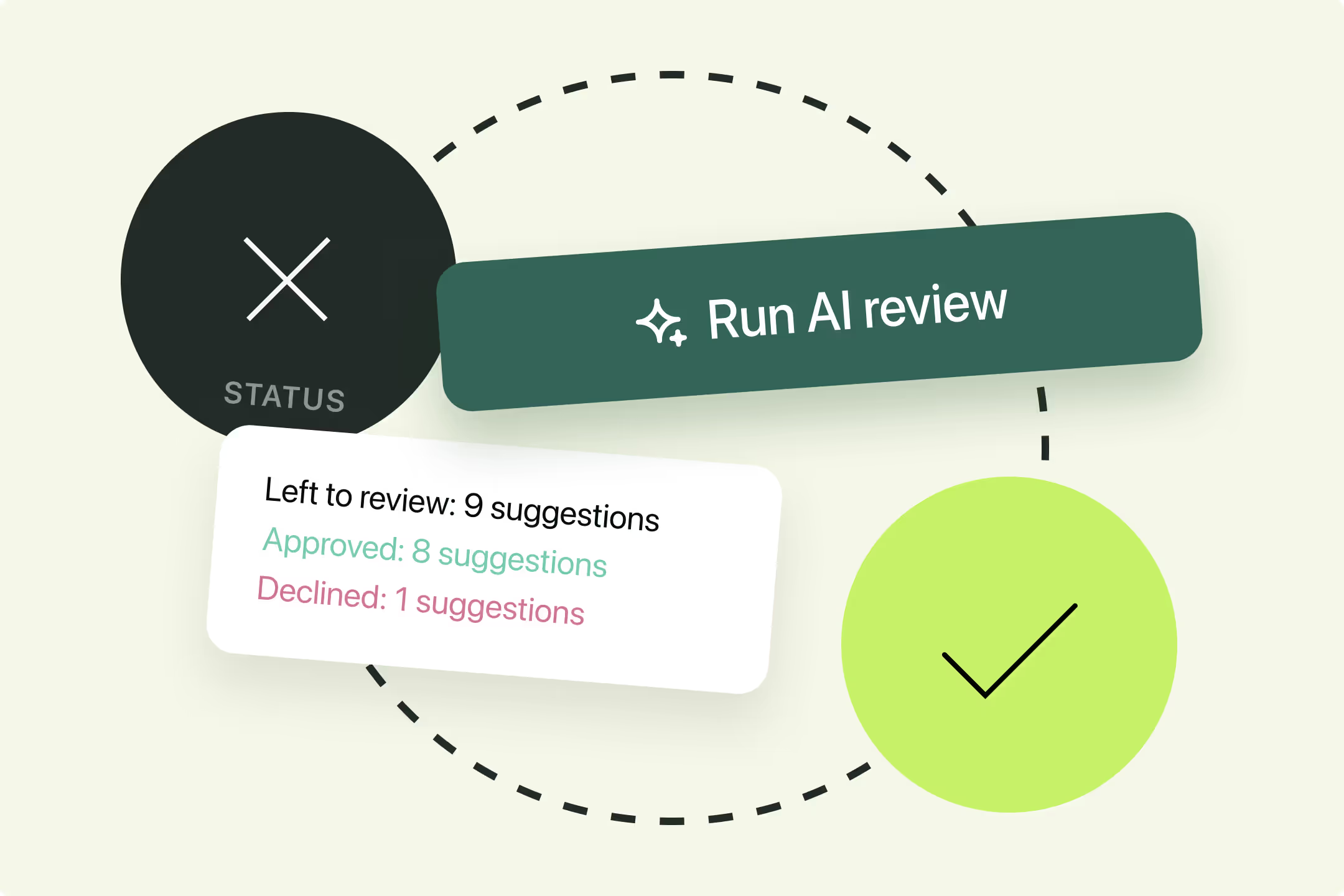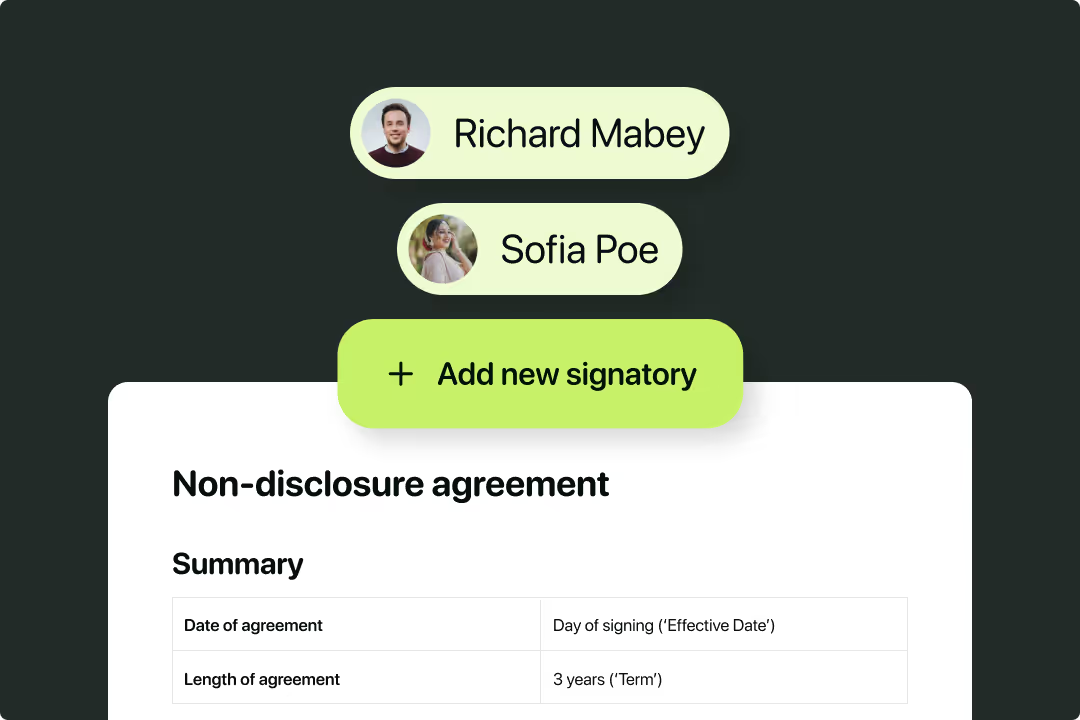Solutions
Customer Support
Resources
AI is a focal point for lots of businesses in 2026, with thousands of platforms entering the market to serve this new demand. The legal industry is no exception.
When we surveyed in-house lawyers, more than half said that their legal teams were planning to use generative AI in the future.

However, with lots of vendors claiming to do different things, it can be tricky to find the right tool for your team.
In particular, it can be difficult to distinguish between contract lifecycle management tools (CLMs) that offer AI functionality, and contract tools exclusively offer AI (A.K.A point solutions, or legal AI solutions).
If you're wondering what sets the two categories apart, and which is right for you, you're in the right place. This guide looks beyond the jargon and explores the key differences between CLM tools and AI point solutions.
CLM software enables teams to manage contracts end-to-end in one platform, with native AI functionality on hand at every stage of the contract lifecycle.
For example, users of a CLM tool like Juro can create, review, negotiate, approve, sign, store, track, and renew contracts - all without leaving the platform.

Juro's AI Legal Assistant meets users where they are in the contract lifecycle, embedding AI in their existing workflows.
This solves the problem of fragmented contract processes that exist across several different tools by providing one unified workspace for contracts. It also makes
AI point solutions are modular, meaning they deliver value at one particular stage of the contract lifecycle, rather than throughout.
For example, AI contract review tools are typically used to flag high-risk clauses in a contract and deviations from standard terms. However, an AI contract review tool won't add much value during the drafting process, or for tracking contracts post-signature.
Similarly, an AI contract extraction tool can be extremely useful for surfacing key contract terms and data, but is redundant for other lifecycle stages, like eSigning and managing renewals.
This means that AI point solutions are typically used alongside several different tools and play a smaller part in a fragmented process.
The biggest and most important difference between a contract lifecycle management system and an AI point solution is the scope and coverage offered.
As we mentioned already, CLM software focuses on streamlining the contract lifecycle by bringing it into one tool. AI point solutions only apply artificial intelligence to a specific stage or process instead.
As a result, there are a few, more nuanced, differences between CLM software and AI point solutions:
It's also worth addressing some of the common misconceptions around CLM solutions and their AI capabilities, and the reality:
The first misconception is that CLM solutions lead to slow or no adoption. While legacy CLM tools can present this problem, modern CLM platforms like Juro buck this trend.
In fact, G2 reports reveal that Juro has the highest user adoption rate and fastest implementation time of all CLM solutions in the category, with businesses like Eucalyptus getting to value in just weeks.
{{quote1}}
Another misconception is that CLM software lags behind AI point solutions when it comes to advancements in AI, simply because they offer a wider feature set overall. Again, this isn't the case. The use cases are just different.
Legal teams that simply need to extract lots of data from third-party contracts using AI will probably find a point solution in this area to be more powerful.
However, businesses that want to turn contracts around faster and embed AI throughout their everyday contract processes (for drafting, reviewing and summarizing contracts) will always benefit more from a tool like Juro.
This doesn't mean that AI is an afterthought for CLM vendors, just that it is not the sole offering.
{{quote2}}
Use cases and capabilities can vary so much between the tools that some businesses choose to adopt both a CLM and AI point solution, depending on the composition of their contracts and their needs.
However, this is more common in larger companies with complex requirements. Most businesses will be able to dramatically improve their contract processes using a CLM solution alone.
The right tool for your team depends on what you need to achieve, and the problem you're solving for.
A point solution will be good enough for businesses that simply want to extract data from third party contracts at scale and aren't prepared to address the problem of a fragmented, multi-tool contract process just yet.
Meanwhile, CLM solutions are designed to streamline and improve the entire contract process, driving efficiencies at every stage. Rather than plugging AI into an inefficient workflow, tools like Juro address the root of the problem first.
The AI is then integrated seamlessly in these improved workflows, providing instant access to AI drafting, review and summaries - all within the same platform you create, negotiate, store and execute contracts.

Ultimately, if you're thinking long-term, you'll want to management process is best achieved by adopting a CLM solution. Otherwise, you simply delay the opportunity to mature your contract processes and save time that can be better spent elsewhere.
With AI point solutions and CLM software having similar price points and implementation times, adopting a more comprehensive contract tool should be a no brainer.
But if you're still undecided, check out these detailed guides comparing Juro with leading point solutions:
Or, read on to discover why 6000+ of the world's leading companies choose Juro for contract management.
Juro's AI Legal Assistant meets users where they are in the contract lifecycle, embedding AI into their existing workflows. This enables teams to agree contracts up to 10x faster than traditional tools, within the guardrails set up by legal.

As one of the first companies to adopt Juro's AI Assistant, 3Commas' legal team experienced these benefits firsthand. 3Commas' Legal Counsel, Yuilia Ivankiv says:
"Juro's AI legal assistant is faster and more convenient than ChatGPT because it analyses all the context from the contract itself, and we can stay within our contract platform without having to switch between different tools.”
And she's not the only one. Lots of forward-thinking legal teams are embracing generative AI day-to-day, and Juro makes integrating AI into your contract processes simple.
Want to see Juro in action? Fill in the form below to book your personalized demo of the tool. To find out more about how in-house legal teams are using AI in their workflows, check out our library of resources on AI for lawyers.

Lorem ipsum dolor sit amet, consectetur adipiscing elit. Suspendisse varius enim in eros elementum tristique. Duis cursus, mi quis viverra ornare, eros dolor interdum nulla, ut commodo diam libero vitae erat. Aenean faucibus nibh et justo cursus id rutrum lorem imperdiet. Nunc ut sem vitae risus tristique posuere.

